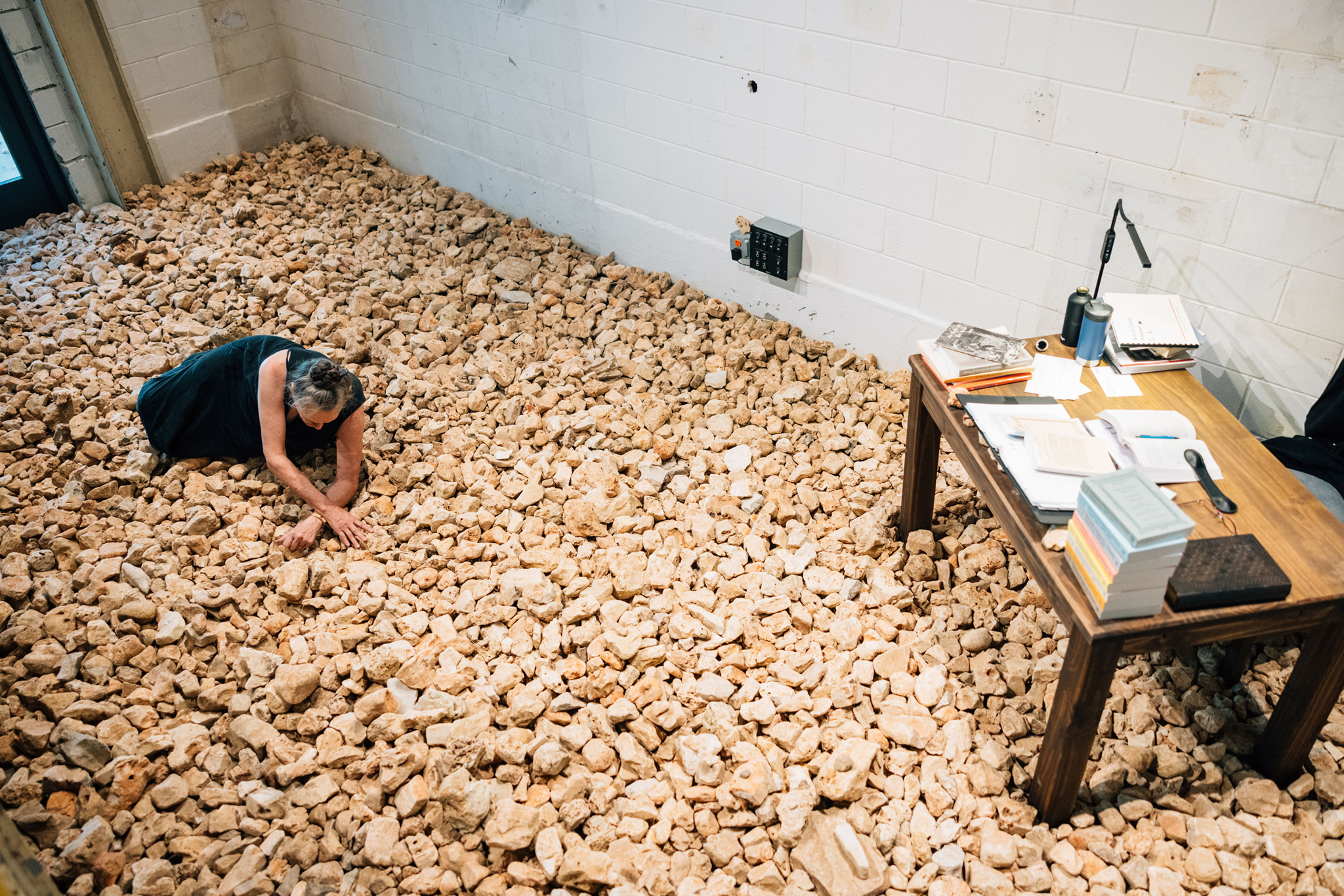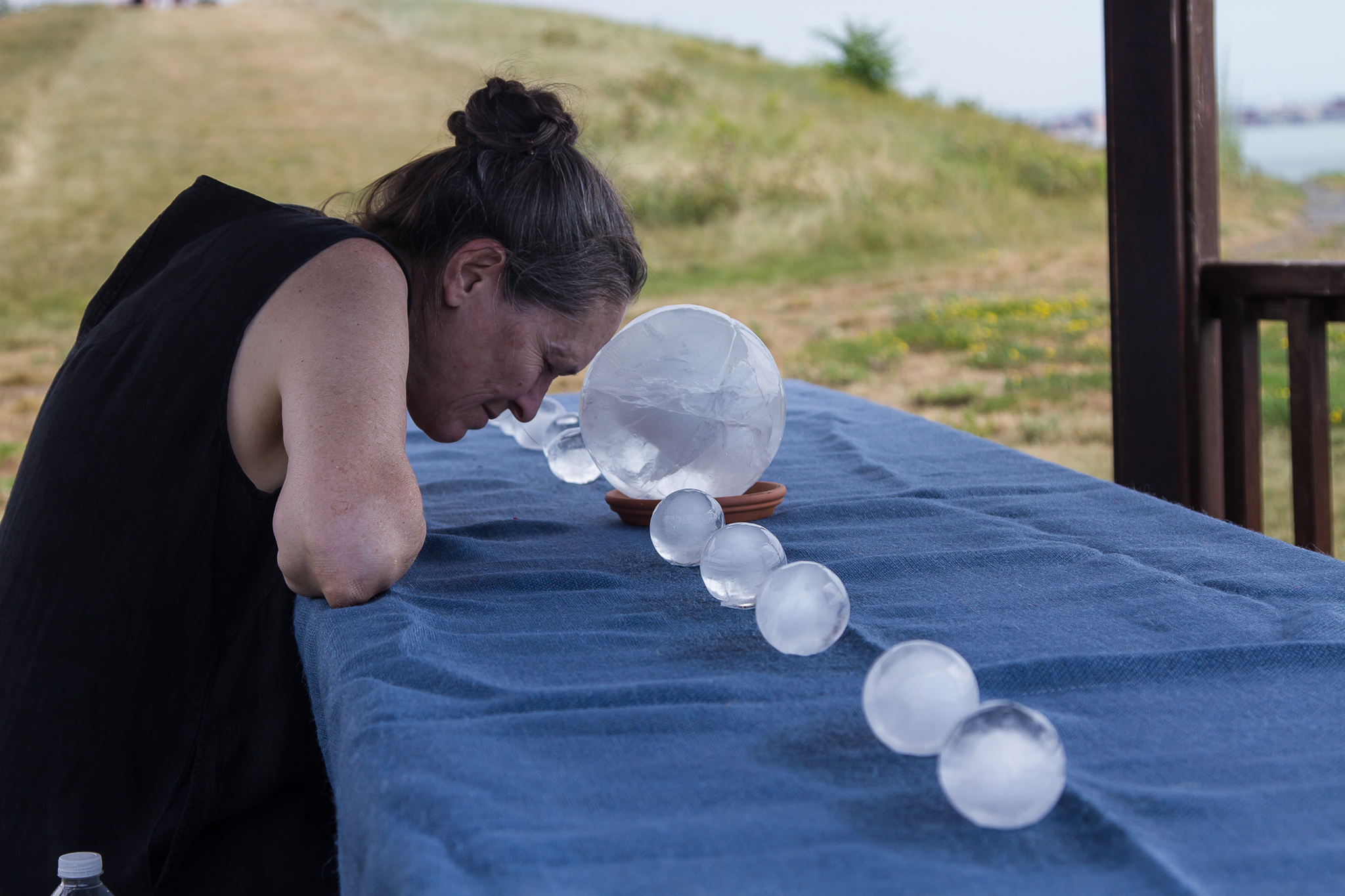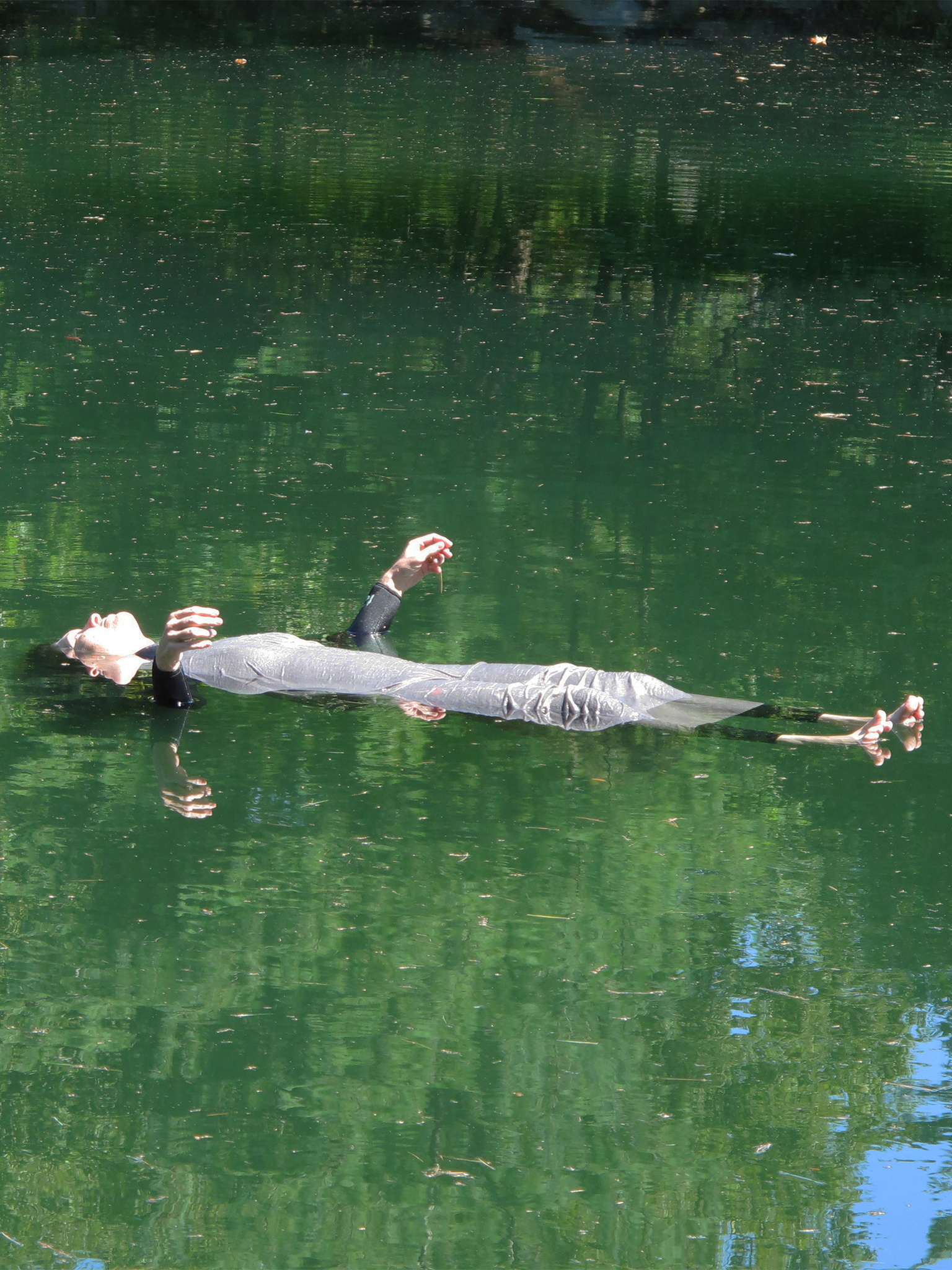Marilyn Arsem CONSIDERING TIME
Intensive Workshop
17th - 21st June 2024, London
SOLD OUT: Workshop Fee - £150 (£110 concession)
Considering Time was presented as part of Future Ritual: Ceremony, a year-long programme exploring performance as a mode of gathering and ritual amidst the fragmentation of contemporary life.
> about Future Ritual: Ceremony
 Bodies in the Land, 6 day/59 hour durational performance by Marilyn Arsem. The Momentary, Bentonville, Arkansas, USA. September 13-18, 2022. Photo by Jared Sorrells.
Bodies in the Land, 6 day/59 hour durational performance by Marilyn Arsem. The Momentary, Bentonville, Arkansas, USA. September 13-18, 2022. Photo by Jared Sorrells.Our lives are ruled by time’s inevitable, relentless passage. Always we have less of it than we had a moment ago. How do we move through time? How does time move through us? What is its effect on the actions and body of the artist? What is its impact on the audience? How might we more consciously use time as an element in performance?
Nothing exists outside of time. Time operates on multiple scales simultaneously and is revealed through different manifestations. Everything around us has a life of its own, sometimes considerably shorter than ours and sometimes much longer.
The presence of time becomes apparent through material and physical processes. What happens when we allow processes to unfold in the time that they need? What occurs when we impose different timeframes on them? Is it possible to control or manipulate time? How does working with extended time alter the execution and implications of our actions?
This workshop examines the significance of time in live performance. We will explore a variety of ways in which we can use time as an active element in our work. Working with time, against time and through time, we will investigate how actions, sites, objects and ourselves are impacted and altered. Serving as witnesses to each other’s work, we will also delve into the effects that playing with time has not only on ourselves as performers but on viewers as well.
The presence of time becomes apparent through material and physical processes. What happens when we allow processes to unfold in the time that they need? What occurs when we impose different timeframes on them? Is it possible to control or manipulate time? How does working with extended time alter the execution and implications of our actions?
This workshop examines the significance of time in live performance. We will explore a variety of ways in which we can use time as an active element in our work. Working with time, against time and through time, we will investigate how actions, sites, objects and ourselves are impacted and altered. Serving as witnesses to each other’s work, we will also delve into the effects that playing with time has not only on ourselves as performers but on viewers as well.
 Seven Disappearances, Durational performance by Marilyn Arsem. TIME SPACE BODY OBJECT – Part 4, Isles Art Initiative, Spectacle Island, Boston Harbor, MA, USA. August 1, 2015. Photo by Nabil Vega.
Seven Disappearances, Durational performance by Marilyn Arsem. TIME SPACE BODY OBJECT – Part 4, Isles Art Initiative, Spectacle Island, Boston Harbor, MA, USA. August 1, 2015. Photo by Nabil Vega.We ask audiences to spend their time with us. What allows them to feel that it was worth giving a portion of their lives to the experience of the work? It is important to know why you want the presence of a witness when you perform, and what you want from them. What do you offer in return?
A significant component of the workshop will be private reflection and writing, as well as group discussions on questions related to the topic of time, not just in the context of creating performances but in our everyday lives as well. We cannot separate our performance art from our daily life. Our lives continue to proceed even as our performances unfold through time.
A significant component of the workshop will be private reflection and writing, as well as group discussions on questions related to the topic of time, not just in the context of creating performances but in our everyday lives as well. We cannot separate our performance art from our daily life. Our lives continue to proceed even as our performances unfold through time.
Participation
The Workshop
This is an intensive, process driven workshop considering time, duration and their impact on material and physical processes.
If you have questions around accessibility, please be in touch with Joseph (producing@futureritual.co.uk).
The workshop is for practicing artists of any level of experience who have an understanding or appreciation of durational methodologies, and who are ready to commit to a rigorous exploration of time.
The workshop is offered in English.
We will work every day from Monday 17th to Friday 21st June. We will meet at 10am on the first day and finish by 6pm on the final day.
Travel to and from the workshop, food and accommodation in London are the responsibility of the participants.
To Participate
The five day workshop is priced at £150 (£110 concession).
This is a subsidised price and all income goes towards the cost of putting the workshop on.
We are accepting a maximum of 16 participants on a rolling basis. We anticipate interest in the workshop will be high, so please be in touch soon.
If you are interested in participating in the workshop, please complete this form, which asks for a brief statement outlining your interest in and experience of the workshop themes. If you would rather send a video or voice recording please note the link and any password in that same space. Please DO NOT send wetransfer or expiring download links.
A deposit of £50 will be requried to secure your place on the workshop, with the balance payable by May 15th.
SOLD OUT
Marilyn Arsem
Marilyn Arsem has been creating and performing live events for more than forty years and has presented her work in thirty countries around the globe. Based in Boston, Massachusetts, USA, she also teaches performance art workshops internationally.
Many of her works are durational in nature, minimal in actions and materials, and have been created in response to specific sites, engaging with the immediate landscape and materiality of the location, its history, use or politics. She incorporates a broad range of media, and often engages all the senses. Her performances are designed to implicate the audience directly in the concerns of the work, to create an experience that is both visceral and intellectual. Sites have included a former Cold War missile base in the United States, a 15th century Turkish bath in North Macedonia, an aluminum factory in Argentina, the grounds of an abandoned tuberculosis sanatorium in Poland, the site of the Spanish landing in the Philippines, and an abandoned Russian mining outpost in the Arctic Circle.
Many of her works are durational in nature, minimal in actions and materials, and have been created in response to specific sites, engaging with the immediate landscape and materiality of the location, its history, use or politics. She incorporates a broad range of media, and often engages all the senses. Her performances are designed to implicate the audience directly in the concerns of the work, to create an experience that is both visceral and intellectual. Sites have included a former Cold War missile base in the United States, a 15th century Turkish bath in North Macedonia, an aluminum factory in Argentina, the grounds of an abandoned tuberculosis sanatorium in Poland, the site of the Spanish landing in the Philippines, and an abandoned Russian mining outpost in the Arctic Circle.
Arsem is a member of Mobius Artists Group, an interdisciplinary collaborative of artists, which she founded in 1975. Arsem taught at the School of the Museum of Fine Arts, Boston for 27 years, establishing one of the most extensive programs internationally in visually-based performance art.
She has been the recipient of numerous fellowships, awards and grants since the 1980s. She was awarded the 2015 Maud Morgan Prize from the Museum of Fine Arts, Boston, for which she created 100 Ways to Consider Time. The work consisted of 100 different six-hour performances by Arsem on the nature of time, performed in 100 consecutive days.
A book on her work, Responding to Site: The Performance Work of Marilyn Arsem, edited by Jennie Klein and Natalie Loveless, was published in 2020 by Intellect Books of the UK.
http://marilynarsem.net
She has been the recipient of numerous fellowships, awards and grants since the 1980s. She was awarded the 2015 Maud Morgan Prize from the Museum of Fine Arts, Boston, for which she created 100 Ways to Consider Time. The work consisted of 100 different six-hour performances by Arsem on the nature of time, performed in 100 consecutive days.
A book on her work, Responding to Site: The Performance Work of Marilyn Arsem, edited by Jennie Klein and Natalie Loveless, was published in 2020 by Intellect Books of the UK.
http://marilynarsem.net
 Adrift, durational performance by Marilyn Arsem. First Biennial Festival of Performance Art and Sound, Contemporary Arts International, Acton, MA, USA. September 7, 2013. Photo by Chelsea Coon.
Adrift, durational performance by Marilyn Arsem. First Biennial Festival of Performance Art and Sound, Contemporary Arts International, Acton, MA, USA. September 7, 2013. Photo by Chelsea Coon.
The workshop is offered as part of CEREMONY, a year long programming cycle curated by Future Ritual, exploring how performance and art making can function as modes of gathering, communion and ceremony amidst the fragmentation of contemporary life.
> about Future Ritual: Ceremony


